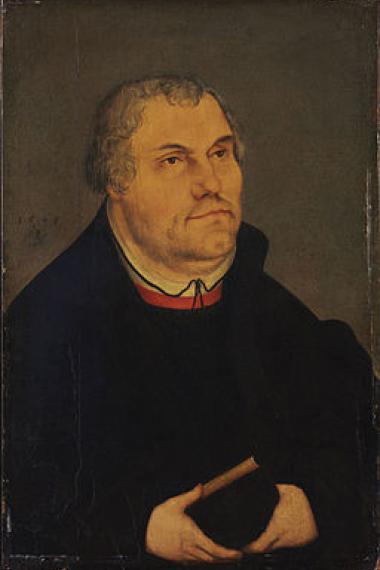
The Scatological Luther
THE SOURCE: “Martin Luther’s Humor” by Eric W. Gritsch, in Word & World, Spring 2012.

THE SOURCE: “Martin Luther’s Humor” by Eric W. Gritsch, in Word & World, Spring 2012.
“I resist the devil, and often it is with a fart that I chase him away.” The fragrant author of this boast? Martin Luther (1483–1546), who ushered in the Protestant Reformation by railing against the sale of indulgences and other practices of the Catholic Church in his famous Ninety-Five Theses (1519).
One would naturally assume that the German monk was a stern and proper man, but Luther was actually rather earthy. That quality reflected an integral part of his understanding of Christianity, argues Eric W. Gritsch, emeritus professor of church history at Lutheran Theological Seminary in Gettysburg, Pennsylvania. “The promise of Christ’s imminent return made Luther serene and saved him from being dead serious about his own self,” Gritsch says.
Luther was exceptionally pious early in life. As a Catholic priest, he struggled mightily with guilt and the spiritual hierarchies of the church. While poring over Scripture at the University of Wittenberg, Luther grew convinced that the heart of Christian life was faith in God, rather than virtuous deeds, as Catholic doctrine held. “We do not depend on our own strength, conscience, experience, person, or works but depend on that which is outside ourselves, that is, on the promise and truth of God, which cannot deceive,” he wrote (emphasis Luther’s).
What followed for Luther was that people’s lives on earth had relatively little effect on whether they would receive God’s grace. That attitude seems to have given him license to indulge in language that would surprise the pious.
Luther used humor to meet his rhetorical goals, “to enhance his biblical witness, to ridicule those in power, and to mock death and the devil.” Twenty-five years after he published the Ninety-Five Theses, for instance, he poked fun at an archbishop who made the faithful pay admission to view sacred remains by circulating a pamphlet (anonymous at first) advertising mock relics, including three flames from the burning bush on Mount Sinai.
His humor tended toward the scatological. He claimed he experienced a spiritual revelation while on the toilet: “The Holy Spirit unveiled the Scriptures for me in the tower.” The pope, a nemesis, was his “dearest little ass-pope.”
Yes, some of his comments fall firmly within the realm of bad taste. Just before he died, Luther told his wife, “I’m like a ripe stool, and the world’s like a gigantic anus, and so we’re about to let go of each other.” But Luther’s humor deserves to be integrated into his legacy, Gritsch argues, noting that little has been made of it in the authoritative Weimar edition of his writings. Luther’s humor is testimony of his conviction that “between birth and death and between the first and second advent of Christ, one must trust the promise of Holy Scripture that all will be well after the final hour of earthly time.”